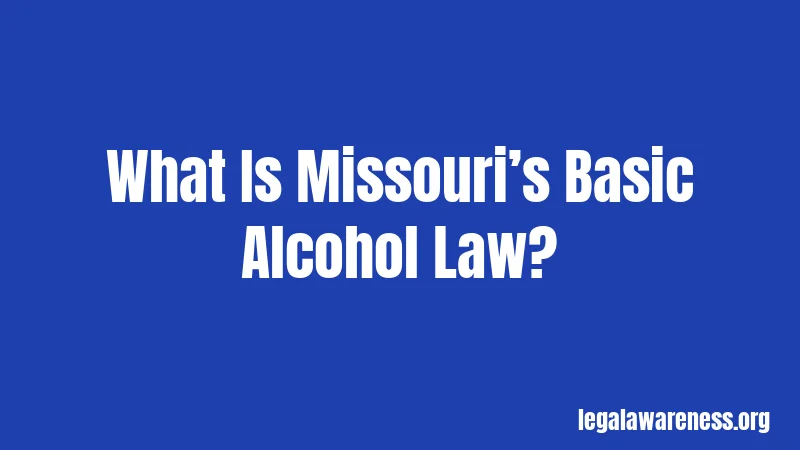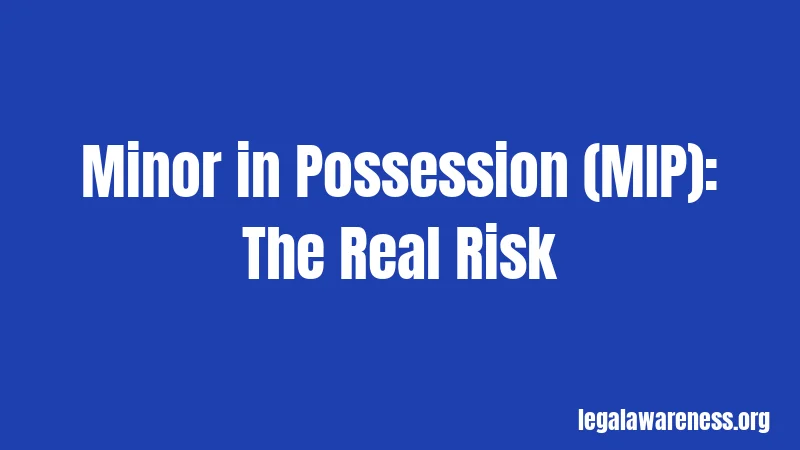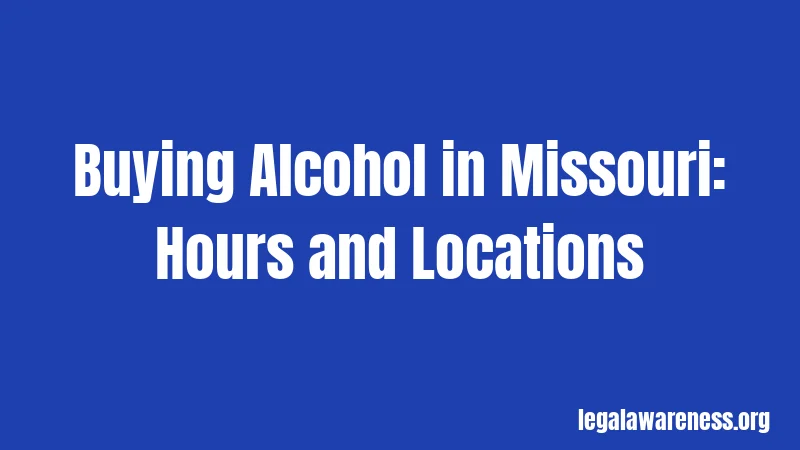Missouri Alcohol Laws in 2026: What Actually Applies to You
Most people have no idea how relaxed Missouri’s alcohol laws actually are. Seriously. Compared to neighboring states like Kansas, Missouri basically said “we’re cool with it.” But don’t let that fool you. The state still has real laws on the books, and breaking them can hit hard. Let’s break down exactly what you need to know.
Missouri earned a reputation for having some of the most laid-back alcohol rules in the country. That’s not an accident. The state has strong ties to beer and wine production—think Budweiser in St. Louis and the vineyards in the Missouri wine country. That history shapes everything about how Missouri handles alcohol today.
What Is Missouri’s Basic Alcohol Law?

Missouri regulates any drink with more than 0.5% alcohol by volume. That means basically everything except some super low-alcohol beverages.
The state uses what’s called a “three-tier system.” Manufacturers make the alcohol. Distributors buy from them and sell to retailers. Then retailers sell to you. This system keeps the supply chain organized.
You can buy alcohol at grocery stores, gas stations, pharmacies, and basically anywhere else that gets a license. Pretty simple, right? You won’t find any counties going “dry” in Missouri—that basically never happens anymore.
The Legal Drinking Age
Let’s start with the basic rule: you have to be 21 years old to buy or drink alcohol in Missouri. Yes, that’s a federal law too, but Missouri enforces it seriously.
If you’re under 21 and you get caught consuming alcohol, that’s a crime. It’s a misdemeanor. You’re not alone if this confuses you—this rule applies to everyone under 21, period.
The penalty hits harder than most people think. You could face up to a $1,000 fine and jail time up to one year. Plus court costs and attorney fees on top of that. Basically, it adds up fast.
Here’s where it gets important: Missouri allows parents to give alcohol to their own kids on private property. But here’s the catch—and this is crucial—your parents have to buy it and supervise it themselves. It’s not a free pass to drink whenever you want.
Minor in Possession (MIP): The Real Risk

Wonder what counts as a violation? If you’re under 21 and police have a reason to suspect you’ve been drinking, they can charge you with Minor in Possession. Don’t even have to be holding the cup.
Just having alcohol in your system is enough. You could be at home, walking outside, or at a friend’s place. The location doesn’t matter as much as whether you consumed alcohol.
A first MIP is a Class D misdemeanor. That means up to $500 in fines. Second or later offenses? That jumps to a Class A misdemeanor with possible jail time (up to one year) and fines up to $2,000.
There’s more though. Your driver’s license can get suspended too. The state calls this the “Abuse and Lose” law. Any alcohol-related violation can trigger license suspension even if you weren’t driving. That’s pretty serious stuff.
The Good Samaritan Law: Your Safety Net
Okay, pause. Read this carefully.
Missouri created a Good Samaritan law specifically to protect young people in emergencies. Here’s what it says: if you or a friend overdoses on alcohol or drugs and someone calls 911 for help, that person won’t get arrested. The person experiencing the emergency won’t either.
This applies to possession charges, minor in possession, and even underage alcohol consumption. The law exists because the state figured that saving a life matters more than a minor possession charge. That’s actually pretty smart thinking.
If you or your friends ever face an overdose or serious medical emergency, call 911. Don’t worry about the legal stuff first. Get help first.
Buying Alcohol in Missouri: Hours and Locations

Here’s the practical stuff: you can buy beer, wine, and liquor at grocery stores, gas stations, and liquor stores across Missouri. It’s easier than in most states.
Alcohol sales hours run from 6:00 AM to 1:30 AM daily. After 1:30 AM, you have to wait until 6:00 AM the next morning. Most cities follow these exact hours, though some have slightly different rules locally.
Want to buy on Sunday? You absolutely can. Missouri allows Sunday sales just like any other day. That’s pretty convenient.
But there’s one rule everyone should know: you cannot buy alcohol within 100 feet of a school or church without written permission from the city council or local authorities. The state takes that seriously.
The Keg Law: Why That ID Tag Matters
Got a question about kegs? This one’s important.
If police break up a party and find a keg where underage people drank, they track down the person who bought it. The ID tag on the keg leads right back to whoever purchased it at the store.
The person who bought it can be fined up to $1,000 and face up to one year in prison for supplying alcohol to minors. That’s not a slap on the wrist. That’s a real crime.
Here’s what happens to the keg itself: if the ID tag is missing or defaced, the deposit is forfeited. The store keeps the money. You lose your cash and face criminal charges. It’s honestly not worth it.
Driving and Drinking: The Serious Stuff
Now, here’s where things get really important.
Driving under the influence is treated harshly in Missouri. The law has two main crimes: DWI (Driving While Intoxicated) and BAC (driving with blood alcohol content above the legal limit).
For adults 21 and older, the legal limit is 0.08% blood alcohol content. Commercial drivers? That’s lowered to 0.04%. Underage drivers face an even stricter rule: 0.02% or higher is enough for a charge.
What does 0.02% mean practically? It’s basically “any alcohol in your system” if you’re under 21. That’s their zero-tolerance policy. The state really doesn’t want young people driving after drinking at all.
Honestly, this part can be tricky. Even if your BAC is below 0.08%, you can still get arrested if police think you’re impaired. The number isn’t your protection. Actual impairment is what matters.
First-Time DWI Penalties: It’s Expensive
Let’s talk about what actually happens if you’re convicted of a first DWI.
You face up to 6 months in jail. Most first-time offenders don’t serve that full time, but judges can sentence you to it. Your driver’s license gets suspended for 90 days (30 days no driving, 60 days restricted driving).
The fines: up to $500, plus court costs around $100 or more. But here’s the hidden cost—you have to complete an alcohol education program called SATOP (Substance Abuse Traffic Offender Program). That costs money and time.
You’ll also need probation, typically 1-2 years. During probation, you can’t drink. Zero alcohol. If you mess up, you go back to jail.
Wait, it gets better (or worse, really). You need an ignition interlock device (IID) for 60 days. That’s a breathalyzer hooked to your car’s ignition. Every time you want to start your vehicle, you blow into it. If it detects any alcohol, your car won’t start.
And one more thing: this conviction stays on your record for 10 years. That affects job applications, housing, loans, and more.
Second DWI: The Consequences Double
Second offense within five years? The penalties jump dramatically.
You face up to one year in jail, with a mandatory minimum of 10 days (unless you do 30 days of community service instead). Fines go up to $2,000. Your license gets revoked for one year—that means no driving at all for 12 months.
The ignition interlock device? Now you need it for at least six months after your suspension ends. So realistically, you’re dealing with an IID for over a year total.
You still need SATOP and probation. This time, the whole situation is way more serious. Prosecutors push for harsher sentences on second offenses. Judges take it more seriously too.
Third DWI and Beyond: Welcome to Felony Territory
Third offense or more? That’s a felony. Specifically, a Class E felony (unless circumstances make it worse).
You’re looking at up to four years in prison. Fines up to $10,000. Your driver’s license gets revoked for 10 years. That’s a decade without driving.
If your blood alcohol was really high (0.15% or more), the penalties get even worse. Judges might not let you suspend any part of the sentence. You serve actual prison time.
This is serious criminal territory. Once you hit three DWIs, your life changes significantly.
High Blood Alcohol: Extra Penalties
Here’s something important: if your blood alcohol was particularly high, Missouri adds extra penalties automatically.
BAC between 0.15% and under 0.20%? You must serve at least 48 hours in jail, no exceptions. BAC 0.20% or higher? That’s at least five days in jail, mandatory.
This is on top of any other penalties. The state figures that having that much alcohol in your system shows serious recklessness. They don’t mess around with this.
Special Circumstances: Kid in the Car
What if you had a minor (someone under 17) in your vehicle when you got a DWI? That changes everything.
You’ll be charged with the penalties for a second offense, even if it’s your first DWI. The state treats having a kid in the car as an aggravating factor. The logic is simple: you endangered a child.
Plus, you could face additional charges for child endangerment. You’re looking at multiple criminal charges stacking up. That seriously complicates your legal situation.
Test Refusal: When Refusing Costs More
Wondering what happens if police ask you to take a breathalyzer and you say no?
You can refuse. Here’s the problem: refusing is a separate offense with automatic penalties. Your license gets revoked for one year, period. That happens even if you’re never convicted of the actual DWI.
Your refusal is also admissible in court. Prosecutors use it as evidence that you knew you were intoxicated and didn’t want to prove it. It hurts your case, basically.
You also have to complete SATOP before getting your license back. And you need an ignition interlock device for six months after the revocation ends.
Honestly, this law makes refusal almost worse than just taking the test.
Drinking in Public: Where You Can’t Do It
Here’s the deal: Missouri doesn’t have a statewide law banning alcohol in outdoor public places. That surprises people.
But you absolutely cannot drink in churches, schools, or courthouses. State law is very clear about that.
Individual cities across Missouri have their own rules though. Some cities ban open containers in public. Others don’t. You need to check your specific city’s ordinances because they vary a lot.
Police can still cite you for disturbing the peace or public intoxication even without a specific open container law. Being drunk in public is its own charge in some situations.
Selling Alcohol Without a License: Don’t Even Think About It
Sound complicated? The actual rule is pretty straightforward.
It’s illegal to sell alcohol without a proper license. Fines go up to $500 for minor violations. Jail time can be 90 days.
But here’s where it gets serious: if you host a party, charge admission, and serve alcohol, that person collecting the money could be charged with selling alcohol without a license. That carries up to two years in prison and $1,000 fines.
If alcohol goes to minors at that party, add child welfare endangerment charges. Now you’re facing multiple felonies stacked together.
This isn’t something to test out. The state takes unlicensed alcohol sales seriously.
Licensed Alcohol Sales: How It Works
Now let’s talk about people who do it legally.
You must be 21 years old to work selling alcohol. If you’re 18 years old, you can stock shelves, work the register, and handle alcohol (except for delivery). You cannot deliver alcohol if you’re under 21—that’s illegal.
Retailers need a license. They get either an on-premise license (bar or restaurant) or an off-premise license (liquor store, grocery store). Some businesses get both.
Licensed businesses follow strict rules. They check IDs carefully. They track sales. Regular inspections happen. It’s a regulated industry with serious compliance requirements.
Special Rules for Wine Direct Shipping
Here’s something specific: Missouri allows wine direct shipment to residents.
Licensed wine shippers can send up to two cases per month directly to your home. Each case can contain up to nine liters. It’s specifically for personal use, not resale.
You have to be 21 years old to receive it. That’s the main requirement. It’s actually pretty convenient if you like wine from specific vineyards.
Your Rights: Getting an Administrative Hearing
If you’re arrested for DWI and your BAC test came back above the legal limit, you can request a hearing within 15 days of arrest.
This is a separate process from your criminal trial. The Missouri Department of Revenue handles the administrative side of your driving privileges. You can request an in-person hearing or a telephone hearing.
Getting that hearing is important because it’s your chance to fight the administrative license suspension separate from the criminal charges.
Frequently Asked Questions
Can I buy alcohol at a gas station in Missouri?
Yes, absolutely. Gas stations with proper licensing can sell beer, wine, and liquor. Missouri’s open approach to retail sales means alcohol is basically everywhere.
What time can I buy alcohol?
Sales happen between 6:00 AM and 1:30 AM. That’s a pretty wide window. After 1:30 AM, you have to wait until 6:00 AM.
Can my parents give me alcohol at home if I’m under 21?
Only on private property and only if they purchase and supervise it themselves. Even then, this permission is limited. You can’t just assume it’s okay everywhere.
What’s the difference between DWI and BAC in Missouri?
DWI means you’re actually impaired. BAC means your blood alcohol content is above the legal limit, period. The state can charge you with either one or both.
If I refuse a breathalyzer, can they still convict me?
Yes, and your refusal actually makes it worse. Your license gets revoked for a year regardless. Plus, prosecutors can use your refusal as evidence in court.
Can you get arrested for DWI if your car isn’t moving?
Yes. Missouri law says you only need to be in “actual physical control” of the vehicle. Turning on the engine counts. You don’t have to be driving.
How long does a DWI conviction stay on my record?
It stays on your driving record for 10 years. It stays on your criminal record permanently unless you get it expunged. That affects employment and other things.
What is the SATOP program?
SATOP (Substance Abuse Traffic Offender Program) is a mandatory education program for anyone convicted of DWI-related offenses. You must complete it before getting your license back.
Do I need to install an ignition interlock device?
For a first offense, you typically need one for 60 days. Repeat offenders need it longer (at least six months). It’s non-negotiable for license reinstatement in many cases.
Can I get my charges reduced?
Maybe. An experienced attorney can challenge the legality of the traffic stop, the accuracy of the breathalyzer, or whether proper procedures were followed. Some cases get reduced to lesser charges.
Special Note: Missouri’s Unique Position
Here’s something worth understanding: Missouri actually resists dry jurisdictions. The state has a law that prevents cities and counties from banning alcohol sales. That’s unusual.
Personally, I think this law makes sense given Missouri’s history with alcohol production. But it also means alcohol is truly everywhere in the state—grocery stores, gas stations, even pharmacies. Access is easy.
That convenience doesn’t change the laws though. Easy access doesn’t mean lax enforcement. The opposite, actually. Because alcohol is so available, the state cracks down hard on misuse.
Final Thoughts
Now you know the basics about Missouri alcohol laws. Here’s the important takeaway: yes, Missouri has relaxed alcohol sales laws compared to other states. That’s real.
But breaking the consumption laws? That’s taken seriously. DWI convictions can cost you thousands of dollars, your driving privileges, and future opportunities. Underage drinking can mean criminal charges and financial penalties.
The key is understanding where the lines actually are. You can buy alcohol easily. You cannot drive after drinking. You cannot be under 21 and consume it. You cannot sell it without a license. Pretty straightforward.
When in doubt about a specific situation, look it up or ask a lawyer. These laws matter, and getting them right protects you.
